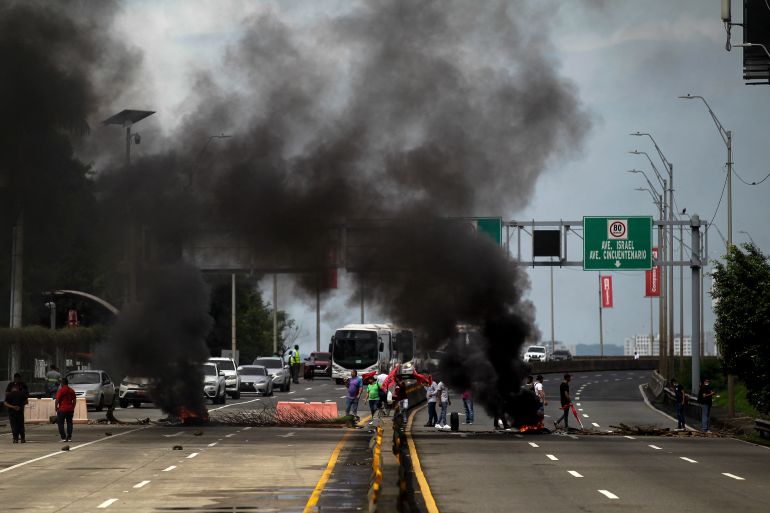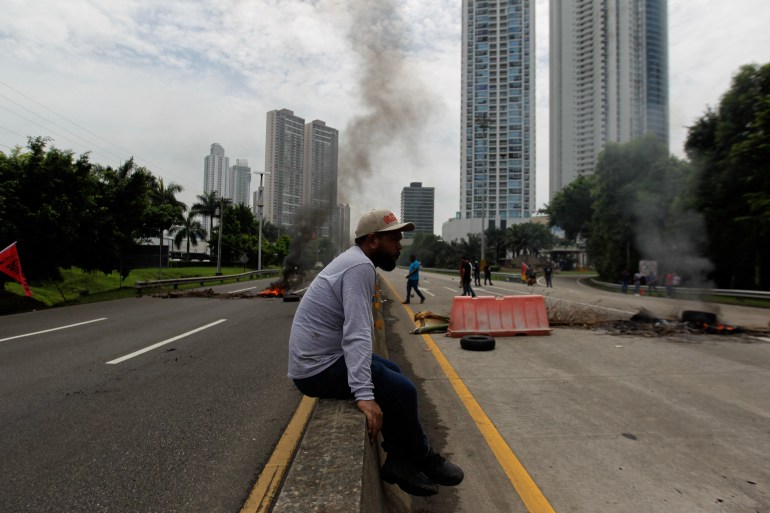New roadblocks go up in Panama as protesters reject gov’t deal
Demonstrators seek price cut in fuel prices to stop their protests on key highways.

Protesters in Panama have erected new roadblocks, rejecting a deal signed with the government to clear the highways in exchange for a fuel price cut.
On Sunday, the government and some protest leaders announced a deal to end more than two weeks of demonstrations over high fuel prices and rising living costs in the country of 4.4 million people.
Keep reading
list of 4 itemsAs Panama tightens visa rules, Cubans brace for tough journeys
Rare disease patients push for access to treatment in Panama
Another son of Panama’s ex-president pleads guilty to corruption
But on Monday, after union leaders consulted grassroots supporters on the deal, some groups decided to continue protesting, according to Luis Sanchez, a leader of the Anadepo civic grouping.
“We had warned the executive that we still have to consult the rank and file,” he told the TVN-2 channel.
The agreement, he added, “was signed under pressure” and members have opted to continue the mobilisation that had seen trucks and banner-waving demonstrators paralyse the strategic Pan-American Highway that connects Panama with the rest of Central America and is the main transport route for goods through the country.
“In the meantime, there is no agreement,” said Sanchez as he tore up a sheet of paper.
The biggest protest on Monday was in the capital, Panama City, with members of the Suntracs construction union closing access roads with burning tyre barricades, causing enormous traffic backups.
There were also new blockades of the Pan-American Highway.
The protests have led to shortages of fuel and food in some areas.
“We are in a bad way; no food, no buses. I wanted to buy rice and … what little can be found is very expensive. The vegetables are bad,” said Angelica Ruiz, a resident of Pacora, east of Panama City, who also had trouble getting to work.

‘We will not weaken’
The government agreed on Sunday to cut the price of petrol to $3.25 per gallon and pursue talks on lowering food and medicine costs that were key among protesters’ concerns.
Last week, it had already reduced the petrol price to $3.95 from $5.20 per gallon in June, but this was not enough to appease the demonstrators.
After Sunday’s announcement, several unions said the agreement was inadequate and had left out many groups.
“We will stay on in the street,” said protester Juan Morales, a farmer from Capira, west of Panama City.
“We will not weaken. We need strong and positive answers,” he told the AFP news agency.
Suntracs General Secretary Saul Mendez called for negotiations that included all groups to discuss “the most pressing issues” in Panama.
Those issues include reducing the costs of fuel, food, medicine and electricity, he said, as well as a general increase in salaries and greater public investment in education.
The protests come as Panama faces difficult economic conditions, with inflation of 4.2 percent recorded in May, along with an unemployment rate of about 10 percent and fuel price hikes of nearly 50 percent since January.
Despite its economy which uses US dollars as its currency and high growth figures, the country has a high rate of social inequality.
The renowned Panamanian singer and activist Ruben Blades spoke out about the protests on Monday, saying that the demonstrators’ economic demands did not go far enough to address the country’s problems.
“The people have not demanded what we really need: the substitution of the corrupt and outdated political paradigm that destroys us morally and economically,” he wrote on his personal blog.